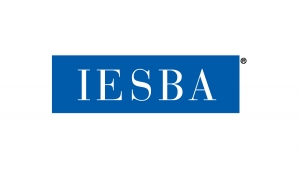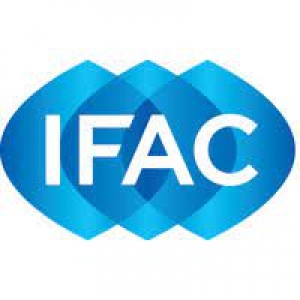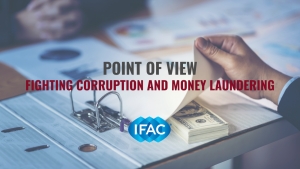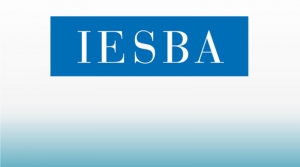عرض العناصر حسب علامة : IESBA
كتيب المدونة الدولية لأخلاقيات المحاسبين المحترفين
أصدر مجلس معايير الأخلاق الدولية للمحاسبين (IESBA) اليوم طبعة 2022 من كتيب المدونة الدولية لأخلاقيات المحاسبين المحترفين (بما في ذلك معايير الاستقلال الدولية ).
تلتزم IESBA بإعداد معايير الأخلاق والاستقلالية العالمية في الوقت المناسب لدعم إعداد تقارير الاستدامة وضمانها
قرر مجلس معايير الأخلاقيات الدولية للمحاسبين (IESBA) بالإجماع على اتخاذ الإجراءات في الوقت المناسب لتطوير معايير الأخلاقيات والاستقلالية الملائمة للغرض والقابلة للتطبيق عالميًا كجزء أساسي من البنية التحتية اللازمة لدعم تقارير الاستدامة الشفافة وذات الصلة والجديرة بالثقة.
معلومات إضافية
-
المحتوى بالإنجليزية
IESBA COMMITS TO READYING GLOBAL ETHICS AND INDEPENDENCE STANDARDS TIMELY IN SUPPORT OF SUSTAINABILITY REPORTING AND ASSURANCE
The International Ethics Standards Board for Accountants (IESBA) has unanimously resolved to take timely action to develop fit-for-purpose, globally applicable ethics and independence standards as a critical part of the infrastructure needed to support transparent, relevant and trustworthy sustainability reporting. This recognizes the need to respond at pace to match the speed of transformation in the corporate reporting landscape. Demand for sustainability information has risen substantially and rapidly in recent years, and such information is increasingly used to support capital allocation or other decisions by investors, customers, current or potential employees, and other stakeholders. It also recognizes the essential role ethics and independence play in the production, reporting and assurance of sustainability information.
The IESBA has tasked its recently established Sustainability Working Group to develop a strategic vision to guide the IESBA’s standard-setting actions in relation to sustainability reporting and assurance. The Working Group will prepare a project plan by December 2022 as a launchpad for commencement of standard-setting work soon after. This work will proceed in tandem with the development of IFRS Sustainability Disclosure Standards by the International Sustainability Standards Board (ISSB), and sustainability-related International Standards on Assurance Engagements (ISAEs) by the International Auditing and Assurance Standards Board (IAASB). The IESBA recognizes the importance of coordinating this work closely with the ISSB and IAASB so that coherent, mutually reinforcing building blocks of standards can be put in place around the same time to support the necessary regulatory infrastructure for sustainability reporting.
“Sustainability has risen to the top of our strategic agenda as societal expectations have unquestionably changed towards the need for companies and organizations to pursue more sustainable business goals, capital has flowed in substantial waves towards Environmental, Social and Governance (ESG)-focused investments, and concerns about market integrity have triggered regulatory mobilizations and actions,” said IESBA Chair Gabriela Figueiredo Dias. “Time is of the essence and it is critical that the ethics standards pillar of the infrastructure be strong and ready to support the sustainability information supply chain. Stakeholder expectations are high and we are determined to take the necessary actions to meet the market needs.”
The IESBA has been proactively engaged in outreach to stakeholders to exchange views and insights on the emerging issues in sustainability reporting and assurance, and is actively involved in discussions with the International Organization of Securities Commissions (IOSCO) and the IAASB on coordinated plans and actions to respond to the developments.
Pending finalization of the IESBA’s plan of work for sustainability-related ethics and independence standard-setting, IESBA Staff will issue in the near term guidance to draw the attention of professional accountants and other market participants to the fundamental principles and key provisions of the IESBA’s International Code of Ethics for Professional Accountants (including International Independence Standards) that already apply broadly to sustainability reporting and assurance.
5 تحديات أخلاقية ستشتد مع زوال الوباء
لأكثر من عام، تم اختبار العالم من خلال التحديات الناتجة عن جائحة COVID-19. ردا على ذلك، أظهر المحاسبون مرونة هائلة
معلومات إضافية
-
المحتوى بالإنجليزية
5 Ethics Challenges that Will Intensify as the Pandemic Wanes
For more than a year, the world has been duly tested by the challenges resulting from the COVID-19 pandemic. In response, professional accountants have shown tremendous resilience. However, as jurisdictions around the world progress toward a more hopeful future, the ethics challenges the accountancy profession and stakeholders face are far from over.
In fact, they might intensify.
As the pandemic fades, many entities will be eager to demonstrate their potential by posting quick wins and an accelerating recovery. Others will continue to navigate the intricacies of government support schemes, and, as those taper, some entities will find themselves on the brink of insolvency. Just as the economic impacts of this crisis unfolded in an uneven and unpredictable manner around the world, so too will recovery efforts. Professional accountants must anticipate a continued period of heightened uncertainty and prioritize their ethics responsibilities all the more.
Since Q2 of 2020, members of a Working Group formed by the International Ethics Standards Board for Accountants (IESBA) and National Standard Setters (NSS) from Australia, Canada, China, South Africa, the U.K., and the U.S. have been meeting regularly to discuss the key ethics issues exacerbated by COVID-19. The Working Group’s charge is to develop implementation support to assist professional accountants in effectively applying the International Code of Ethics for Professional Accountants (including International Independence Standards) (the Code) when facing circumstances created by the COVID-19 pandemic.
Below is an examination of several ethics considerations that will be especially pressure tested during this period of recovery. Facing these conditions simultaneously demands renewed focus on the dynamics that exist in the relationship between professional accountants and entities as they face extraordinary circumstances for at least the next few years.
1. Pressures from an Uneven Economic Recovery: Accountants Must Be Agile Yet Resolutely Committed to the Code of Ethics
Every entity, sector, and jurisdiction will emerge from this global crisis differently. While at least one dose of the vaccine has been administered to approximately 60% of people in Israel, 52% in the U.K., 43% in Chile and the 45% in U.S. as of early May 2021, other countries do not anticipate vaccine availability increasing until at least the second half of the year. For professional accountants, that might mean working within employer organizations and serving client entities that are in vastly different stages of recovery. The truth of the matter is even when an economy fully reopens, there is likely to be at least 12-18 months more of rebuilding and playing catch-up that still has to occur. During this time of profoundly uneven progression, professional accountants will be under huge strain.
We all face a new reality ahead. The pandemic created myriad opportunities for unethical behaviour. The uneven recovery might breed more of these opportunities. These might arise, for example, from increased estimation uncertainty because previous estimations established during the pandemic will be based on facts or assumptions that might no longer apply. In the context of audits of financial statements, pressures from the client and from the rapidly shifting landscape during the recovery might weigh on judgments and decisions regarding the use of non-traditional audit procedures without proper regard for the fundamental principles of objectivity, and professional competence and due care.
Agility will be a critical skillset in navigating the uncertain months and even years ahead. Importantly, while remaining nimble, professional accountants must continue to adhere to the Code, including applying its conceptual framework in these atypical situations.
2. Demands for Greater Support and Efficiency: Auditors of Financial Statements Must Carefully Consider Independence and Familiarity Issues
In the coming months, auditors of financial statements must balance a multitude of unexpected variables. Client demands will likely increase and fluctuate widely. Audit firms will be asked to do things, formally and informally, to support and advise their clients. It’s imperative that auditors continue to acknowledge that the provision of a non-assurance service to an audit client, including advice or recommendations, might create independence issues and heighten ethics pressures. For example, auditors must be cognizant of the pressure to turn a blind eye, act without due care, inadvertently take on a management responsibility for an audit client, or provide inappropriate opinions on the viability of business operations and assets that have likely fluctuated tremendously. In some jurisdictions, such as the U.K., missed filing deadlines and the failure on some companies’ part to apply for extensions have led to automatically downgraded credit ratings. As a result, companies are pressured to have their audits completed quickly at any cost. The ethical responsibility to comply with the Code’s fundamental principles of integrity, objectivity, professional competence and due care, as well as professional behavior must remain top of mind.
In the wake of particularly challenging financial periods, some entities – especially those that are small and less complex – might want to avoid the additional complications and costs of engaging more advisors and feel inclined to streamline professional support by turning to their auditors. Auditors that provide such non-assurance services (NAS) to audit clients must continue to comply with the Code’s NAS and Fee-related provisions. In particular, auditors should be on the lookout for changes that might affect an audit client’s ability to make all judgments and decisions that are the proper responsibility of management. Further, it is important that the pressures of the pandemic do not undermine the auditor’s obligation to identify, evaluate and address threats to independence that might arise from the provision of such NAS.
The business environment in which the broader accountancy profession operates has gone through unprecedented changes. Such changes have implications on employing organizations, the internal operations of firms, the clients they serve, as well as the nature of certain client interactions and relationships. For professional accountants to maintain the highest standards of ethical conduct, and where applicable, be independent, they must remain alert to new information and changes in facts and circumstances. For example, think about public companies that link the finance team’s compensation to the organization’s performance. In such instances—especially at a time when these companies might be struggling financially—professional accountants (both in business and in public practice) must be keenly attuned to what motivates management, and how these motivations might bias key performance factors or indicators such as revenue forecasting, assumptions and estimates.
3. Risks Regarding Rapid Digitalization: Accountants Must Be Alert to Cyber Crimes
The rapid speed of digitalization and tech adoption has raised questions about how accountants and firms are to identify, evaluate and address threats to compliance with the fundamental principles and independence that might be created by the development, use and implementation of technology. In Australia alone, 79% of small and medium businesses say they are expanding software purchases for a more digital future, according to a Gartner study. Nearly half say digital solutions upgrades are happening as a direct result of the pandemic. Even under the best circumstances, the acceleration of digital transformation presents risks. In crisis circumstances, those risks increase exponentially.
For example, the pandemic saw cybercrimes and fraud increase globally as unusual and remote circumstances were taken advantage of and new ways to exploit a broader and deeper range of organizations and individuals were found. In the U.S., cybercrime reports nearly doubled in 2020, according to the Federal Bureau of Investigation. The U.K. saw at least a 30% increase. In parts of Latin America, cybercrimes spiked 60% in the early months of COVID when compared to the same period in 2019. This stark trend is unlikely to abate during the recovery phase, highlighting the continuing challenges to adhering to the fundamental principles of integrity, objectivity, professional competence and due care and confidentiality, especially as companies might have skipped steps or cut corners on cyber security and related measures to keep doing business in the remote environment. Professional accountants and firms should consider whether circumstances may warrant the use of specialists during this time to assist in identifying, evaluating and addressing new risks, such as cyber threats.
Moreover, as jurisdictions see some return to pre-pandemic norms, many entities will likely choose not to return to fully in-person workplaces, and many professionals, including accountants will elect to continue working remotely where possible to preserve the flexibility afforded to them during COVID. Employing organizations must become ever more diligent and innovative in transitioning back to in-person work. It is critical to consider architecting hybrid or virtual protocols that consider best practices, including for example, data hosting and management functions while faithfully abiding by ethical obligations. The risks of complacency are far too great. Professional accountants must apply a deeper understanding of data analytics and technology to their work while being fully attuned to the ethical risks in order to uphold the profession’s good reputation.
As professional accountants continue to evolve ways of working in a world that is more hybridized, with companies operating from both offices and employees’ homes, several personnel factors should be considered. First are concerns about the skills required to operate effectively and ethically in a more digital environment. The profession will need to further invest in professional competencies regarding technology and information systems. Related to that are concerns around capabilities and learning for new talent, who might be at a disadvantage stemming from a lack of in-person interaction with more senior colleagues.
4. Burnout and Mental Health of Teams and Talent: Accountants Must Strive for Resiliency and Solutions
There is growing concern around mental wellness and the state of mind that is required to think critically, rather than just accept information at face value. More than a year into the pandemic, individuals are under immense stress and many are suffering emotionally. In 2020, various studies showed that many adults in jobs that did not normally require them to work outside of their homes reported symptoms of depression and anxiety.
The accountancy profession must be cognizant of the mindfulness required to act competently, with integrity and due care, and to be objective in exercising judgments without being compromised by bias. As such, professional accountants must be conscious of issues colleagues could be facing—and not talking about—that might impact judgments and ethical decision making.
The need for strong organizational culture, with established and open communication channels, as well as protocols for how to address circumstances where staff might not be able to bring their full mental acuity to a particular task or job, is essential as complexities and stressors proliferate.
5. Predisposition to Focus on the Past: Accountants Must Recognize the Shift and Focus on the Future
One of the biggest challenges professional accountants face amidst the pandemic recovery will be continuing to seek out a better understanding of the issues that still lie ahead and what the ethics consequences of them might be. For example, the pace of digital transformation and use of technology such as machine learning automation in products and services has been unprecedented. In addition to the challenges related to cyber security and fraud mentioned above, it is imperative the profession stay on top of responsible automation.
As trusted advisors, it is the duty of professional accountants to be competent in these advancements where they are involved in their development and implementation. This involves attaining and maintaining the knowledge and skill required for the job. In the context of today’s world, this means learning how to properly understand threats to the fundamental principles of ethics from the technology. As new or unresolved issues from the pandemic emerge, it will result in higher degrees of uncertainty which will make it increasingly difficult to keep a focus on evolving the profession for the future, but this will be a necessity. Together, professional accountants must acknowledge how the pandemic changed companies and social norms and strive to be a step ahead.
Professional accountants, like others in the workforce, are operating within an unusual context right now. Around the world, corporate priorities and public expectations are changing rapidly. These changes will have implications on the accountant’s role. For example, the rise in stakeholder capitalism and subsequent call for Environmental, Social and Governance (ESG) reporting are leading investors to not only seek more reliable and comparable information in the area of ESG reporting, but also obtain assurance on such information. Professional accountants must answer that call.
While we begin to realize life beyond COVID-19, we must all be increasingly thorough in assessing the impact these changes are having on views and perceptions about ethics requirements, especially as it relates to the relationship between the accountant and the entity. Just as the pandemic increased risks of unethical behaviour, efforts to rebuild will equally increase opportunities to evolve for the better.
محاربة الفساد وغسيل الأموال من وجهة نظر الاتحاد الدولي للمحاسبين
إن عواقب الفساد كبيرة وواسعة الانتشار، من التكاليف المباشرة للأفراد والمجتمع، إلى تشجيع السلوك الإجرامي وتقويض الثقة في المؤسسات.
معلومات إضافية
-
المحتوى بالإنجليزية
Fighting Corruption and Money Laundering
The consequences of corruption are significant and widespread, from direct costs to individuals and society, to encouraging criminal behavior and undermining trust in institutions. Grounded in a strong ethical code, professional accountants across the globe play a critical role in the fight against corruption, bringing essential transparency, relevance and integrity to the systems that underpin vibrant economies and making corruption less profitable and easier to prevent, detect and remedy. IFAC’s advocacy in this space reflects our strongly-held belief that serving the public interest by fighting corruption, including money laundering, is central to the accountancy profession’s activities.
PRINTER FRIENDLY VERSION
Translation Available in
EN ENGLISH
AR ARABIC
FR FRENCH
RU RUSSIAN
ES SPANISH
1. G20’s Anti-Corruption Action Plan
2. Anti-Money Laundering
3. Whistleblowing
4. Public Sector Transparency
5. Private Sector Transparency
1. G20’s Anti-Corruption Action Plan
IFAC supports the G20's Anti-Corruption Action Plan 2019-2021 (Action Plan), which we use as a framework for our anti-corruption advocacy.
We agree with the Action Plan that preventing and fighting corruption is critical in building national and global economic prosperity, and that no country is immune.
We also support UN SDG 16 Peace and Justice: Strong Institutions, with emphases on Target 16.5: substantially reduce corruption and bribery in all their forms, and Target 16.6: develop effective, accountable and transparent institutions at all levels.
We believe that the accountancy profession can and must advance the Action Plan and can have the greatest impact in the areas of anti-money laundering, whistleblowing, public sector transparency and private sector transparency.
We welcome the G20’s intention to strengthen engagement with the business community in implementing the Action Plan, and IFAC is committed to engaging with the G20 to achieve these goals. We look to hold global policy makers accountable for progress on implementing their commitments and encourage our member Professional Accounting Organizations (PAOs) to do the same with respect to their domestic policy makers.
التعديلات المقترحة المتعلقة بإدارة الجودة الصادرة عن المجلس الدولي لمعايير أخلاقيات مهنة المحاسبة
تحديث -يقترح المجلس الدولي لمعايير أخلاقيات مهنة المحاسبة IESBA تعديلات مطابقة على المدونة بعد إصدار مجموعة معايير إدارة الجودة من المجلس الدولي لمعايير المراجعة والتأكيد IAASB
معلومات إضافية
-
المحتوى بالإنجليزية
IESBA PROPOSES CONFORMING AMENDMENTS TO THE CODE FOLLOWING ISSUANCE OF IAASB’S SUITE OF QUALITY MANAGEMENT STANDARDS
(New York, NY, August 10, 2021)
The International Ethics Standards Board for Accountants (IESBA) today released for public comment the Exposure Draft, Proposed Quality Management-related Conforming Amendments to the Code.
The original document posted did not include red-lined edits and has since been updated to include these.
The proposals aim to align the Code with the International Auditing and Assurance Standards Board's (IAASB's) suite of quality management standards, especially ISQM 1 and ISQM 2, through conforming amendments so that the Code is consistent and interoperable with these IAASB standards. The review has encompassed the recent revisions to the Code pertaining to Role & Mindset and the Non-assurance Services and Fee-related provisions of the Code.
This project falls under the umbrella of IAASB-IESBA coordination, a strategic commitment of the two Boards, and builds on their overarching commitment for enhanced connectivity and coordination to better serve the public interest.
For more information about IAASB's suite of quality management standards, please click here.
How to Comment
The IESBA invites all stakeholders to comment on the Exposure Draft by visiting the IESBA website. Comments are requested by October 5, 2021.






